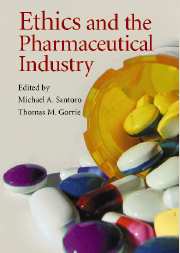Book contents
- Frontmatter
- Contents
- Tables
- Figures
- About the Editors
- Contributors
- Preface
- Acknowledgments
- Foreword
- Introduction: Charting a Sustainable Path for the Twenty-First Century Pharmaceutical Industry
- PART I PROFITS, PATIENTS' RIGHTS, AND SCIENTIFIC PROGRESS: THE ETHICS OF CLINICAL RESEARCH CONDUCTED IN PRIVATE ENTERPRISES
- Introduction to Part I
- 1 Drug Research: Between Ethical Demands and Economic Constraints
- 2 Emerging International Norms for Clinical Testing: Good Clinical Trial Practice
- 3 The Regulatory and Ethical Challenges of Pediatric Research
- 4 Including Children in Research: Participation or Exploitation?
- 5 Racial and Ethnic Inclusiveness in Clinical Trials
- 6 The Rights of Patients to Participate in Clinical Research
- 7 How Should Government Regulate Stem-Cell Research? Views from a Scientist-Legislator
- PART II MARKETING AND THE EFFICIENT UTILIZATION OF HEALTHCARE RESOURCES: ETHICAL AND PUBLIC POLICY CHALLENGES
- PART III PATENTS, PRICING, AND EQUAL ACCESS
- PART IV CONCLUDING THOUGHTS: CHARTING A SUSTAINABLE PATH FOR THE TWENTY-FIRST CENTURY
- Notes
- Index
3 - The Regulatory and Ethical Challenges of Pediatric Research
Published online by Cambridge University Press: 04 December 2009
- Frontmatter
- Contents
- Tables
- Figures
- About the Editors
- Contributors
- Preface
- Acknowledgments
- Foreword
- Introduction: Charting a Sustainable Path for the Twenty-First Century Pharmaceutical Industry
- PART I PROFITS, PATIENTS' RIGHTS, AND SCIENTIFIC PROGRESS: THE ETHICS OF CLINICAL RESEARCH CONDUCTED IN PRIVATE ENTERPRISES
- Introduction to Part I
- 1 Drug Research: Between Ethical Demands and Economic Constraints
- 2 Emerging International Norms for Clinical Testing: Good Clinical Trial Practice
- 3 The Regulatory and Ethical Challenges of Pediatric Research
- 4 Including Children in Research: Participation or Exploitation?
- 5 Racial and Ethnic Inclusiveness in Clinical Trials
- 6 The Rights of Patients to Participate in Clinical Research
- 7 How Should Government Regulate Stem-Cell Research? Views from a Scientist-Legislator
- PART II MARKETING AND THE EFFICIENT UTILIZATION OF HEALTHCARE RESOURCES: ETHICAL AND PUBLIC POLICY CHALLENGES
- PART III PATENTS, PRICING, AND EQUAL ACCESS
- PART IV CONCLUDING THOUGHTS: CHARTING A SUSTAINABLE PATH FOR THE TWENTY-FIRST CENTURY
- Notes
- Index
Summary
By the 1970s, the American Academy of Pediatrics (AAP) and the Food and Drug Administration (FDA) had publicly stated that the same level of scientific investigation required before a product is marketed for adults should be required for pediatric therapies. We entered the twenty-first century with hundreds of exciting new therapies, studied and approved for use in adults, that were being used in pediatrics without even the most fundamental of studies. Studies of absorption, distribution, metabolism, and elimination (ADME) and clinical trials were not conducted in the pediatric population. Most pediatric dosing calculations were done on a weight-based metric derived from adult dosing recommendations. It is counterintuitive that a society would demand strict controls on product development for the more physiologically mature and stable organism – the adult – and simultaneously ignore the need for scientific data to guide therapeutic use in the more complex and physiologically evolving and developing pediatric population. This was the situation, however, toward the end of the twentieth century. This chapter describes (1) the regulatory changes that opened the gateway to pediatric trials; (2) parameters for the disclosure of trial results; (3) scientific information gleaned from pediatric trials; (4) pediatric safety concerns; and (5) ethical considerations in pediatric research.
Pediatric research: the challenge to governments
It is an unfortunate truth that children not only are the therapeutic orphans described by Dr. H. Shirkey in 1963, but also are often the “sentinel canaries” in the mine of pharmaceutical therapeutics.
- Type
- Chapter
- Information
- Ethics and the Pharmaceutical Industry , pp. 48 - 67Publisher: Cambridge University PressPrint publication year: 2005
- 1
- Cited by



